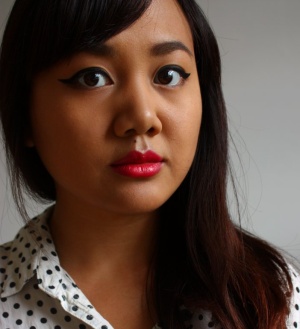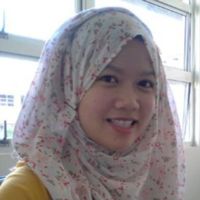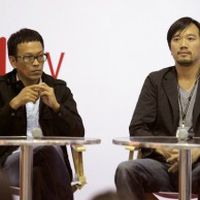Short Story: Smile | Pimpan Nuallak | United Kingdom
 [caption id="attachment_36517" align="alignright" width="328"]
[caption id="attachment_36517" align="alignright" width="328"] Pimpan Nuallak's short story received 243 votes. This image was captured 1 September 2013 at 11:59 pm (Singapore SGT).[/caption]
Pimpan Nuallak's short story received 243 votes. This image was captured 1 September 2013 at 11:59 pm (Singapore SGT).[/caption][caption id="attachment_35708" align="alignnone" width="240"]
Smile
A short story by Pimpan Nuallak
‘Are you from Pattaya?’ the customer asked me before I even took his drinks order—me, a Londoner born and raised.
He sat with his two companions around the little table, another man and a woman, all of them pink from sun that had not yet come to England.
‘We’ve just come back from Pattaya,’ says the first man. ‘Hot, beautiful place, beautiful, um, girls…’
‘That’s why he wanted to come here,’ said the second man, ‘he just couldn’t get enough!’ The two men laughed; the woman, the pale negative image of a pair of sunglasses banding her eyes, directed a sour look at the first man and then at me.
Despite my efforts at retaining, firstly, a warm smile (the oft-described feature apparently found on every face belonging to a Thai national) and, secondly, a calm demeanour (guide books tell me that all sixty million of usmilitary includedare peaceful), my patience thinned.
‘They’re just like that, the farang,’ Wannapa, another waitress, once said to me on our break, ‘Don’t take it so personally, Usa.’
‘I know it’s not just about me, P’Wannapa.’ The bitten skin around my nails was unsightly.
Wannapa looked away for a moment, then said, ‘If they bother you, I can serve ‘em. It’s no trouble.’
My nod must have seemed dismissive, but I felt it best to keep my gratitude quietalong with the certainty that I would never ask Wannapa. The idea of passing my responsibility onto someone else was disquieting.
So my smile—that famous Thai smile—was nailed onto my face as I stood by the table, head inclined at a gentle angle to show I was listening to their jeering laughter. The woman’s suspicious, pitying gaze added up my breasts and skin.
‘I’ll have a beer, please,’ she said, speaking at me. The men stopped laughing and followed suit, repeating her request.
With their beers they had the following dishes: satay, curry as smooth and mild as mayonnaise, treacly pad thai, grilled sirloin. They ordered no rice.
As if to brush aside their earlier comments the men asked whether this—they gestured at their half-eaten dishes—was the sort of food I ate at home. My smile showed off the hard-won beauty of my straightened teeth, courtesy of the NHS and a grumpy orthodontist working at my mouth between the ages of eleven and thirteen. It was somehow easy to nod and be complicit in their fiction.
They seemed to particularly relish the food after that, belching and leaving a too-generous tip.
My head felt heavy with the silence I kept about myself, about the women (“girls,” the men called them) of Pattaya, and I felt ashamed.
Work was necessary. Money ensured immediate survival and eventual dignity: every spare penny would be saved for my ticket to Thailand, the research trip that my dissertation required. My parents were gladly coming with me; they still called Thailand “our home” after two decades in Britain.
Once a journalist wrote that the restaurant I worked in, Mae Pim’s Kitchen, was “like visiting the proprietor’s home.” While there was indeed the permanent sweet whiff of cooked rice about the place, and my ponderously British-accented Thai joined the fluent chatter of my colleagues as we gossiped, it was nothing like home. My home eschewed the use of Buddha heads as mere décor.
Speculations on the journalist’s idea of home wandered through my mind as I fumbled for the keys to my own front door at midnight.
Despite their own long days at work, my parents had—as usual—stayed up to welcome me. My mother’s welcome began on a high ‘Ah,’ that sweetly descended, pleased and relieved. She drew her woolly dressing gown around herself as we chatted about our day. Nearby, the microwave sounded with a crisp ding.
‘How are you doing, luk?’ my father said as he emerged from the kitchen, handing me a steaming plate.
I gave my parents the only genuine smile I had given that day. They went to bed, content that their work was done. To my parents it was simply understood that their child would stay home until further notice. The patience of their love was sometimes unbearable.
Keys clattered under my fingers as I worked, motivated by gratitude and guilt and nourished with acacia omelette and white rice, spoonfuls of bitter comfort. It was a curious feeling to study my own culture and attempt to know a Thailand I had never visited, yet I was certain of its importance. I wanted to seek my own truths.
This trip would be my first ever visit; for my parents it would be a return, finally, after twenty-two years. I remembered my parents’ excited voices as they Skyped with friends in Thailand, laying plans, and looked forward to our time together.
Follow @pearnuallak
Savoured this short story about a Thai girl in the UK. A 'Thai' perspective you don't see often http://t.co/Io1rE3EIo8 via @culture360_asef
— En (@entinomy) August 19, 2013
The shortlisted stories have been selected by a panel of judges appointed by the Ubud Writers& Readers Festival. The views expressed in the shortlisted stories are strictly those of the authors and do not necessarily reflect the opinion of the Asia-Europe Foundation (ASEF). The copyright of this story remains with the author.
----------------------------------------------------------------------------------------------
Similar content
posted on
19 Aug 2013
posted on
19 Aug 2013
posted on
19 Aug 2013
posted on
19 Aug 2013
posted on
19 Aug 2013






